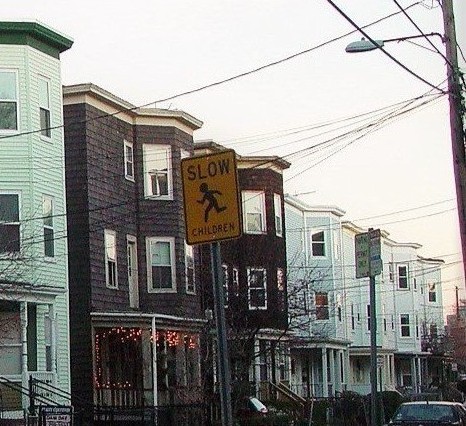
This mural depicts Cambridge residents’ successful fight against a proposed “Inner Belt,” an 8-lane highway that would have cut through the Cambridgeport neighborhood, displacing 4,500 residents.
Housing in Cambridge, whether rented or owned, is unaffordable for many residents, adding to inequality in our city.
The private housing market controls prices and rents, keeping people insecure about the future of their housing. CLTs offer the stability of permanent, affordable housing.
As Cambridge tenants, homeowners, displaced community members, and activists, we can use our collective knowledge and power to build an alternative, cooperative approach to housing.

The cost of housing has risen quickly in Cambridge, outpacing Cambridge’s rising median household income. Many of our community members, especially young adults, older adults, and people of color, make only a fraction of the median income and are quickly being displaced.
We believe that housing is a human right and should be accessible to all, putting people over profit. Stable, affordable housing is crucial for our communities, and we can provide that by acquiring and maintaining property as a shared community resource. While our primary emphasis is on housing, a community land trust may include community spaces such as: gardens, community centers, open space or other uses that enrich the neighborhood. Decisions about the land are made by community members, particularly those most impacted by displacement or those who have been historically excluded. This builds the cooperation and the collective power to recognize and support our diverse communities.
- In Cambridge, housing costs have increased faster than the median household income, which in 2022 was $121,790. Almost 30% of the households in our community earn less than half of that income, and they are quickly being displaced.
- As of the last quarter of 2023, the monthly median rent for a market rate apartment in Cambridge was $2,625 for a 1BR unit, $3,375 for a 2BR unit and $3,850 for a 3BR unit. Most of our community members are struggling to pay these rents. Over half of renters spend more than 30% of their income on housing and over a quarter spend over 50% of their income on housing.*
- Homeowners are cost-burdened* as well. From 2002 to 2022, the median market rate sale price of a single family home jumped 196% to $1,925,000, two families rose 163%, and the cost of a condominium rose 150%. This has left over a quarter of Cambridge-area homeowners paying more than 30% of their income on housing.
*A household is considered cost-burdened if they spend over 30% of their income on housing and severely cost-burdened if they spend over 50% of their income on housing.